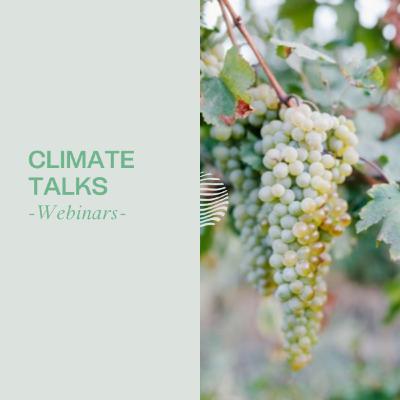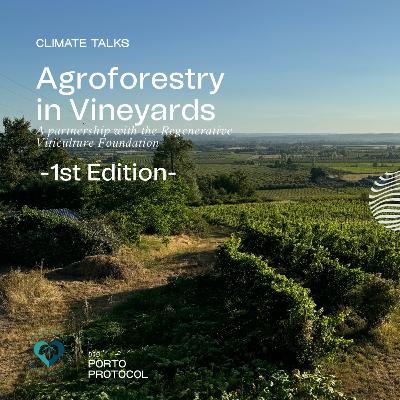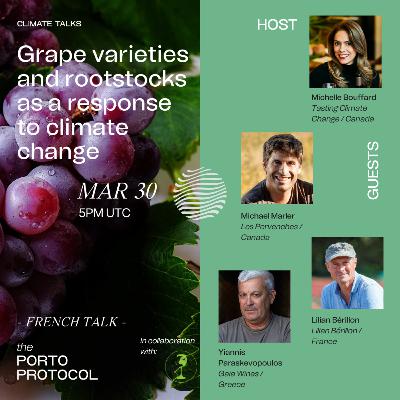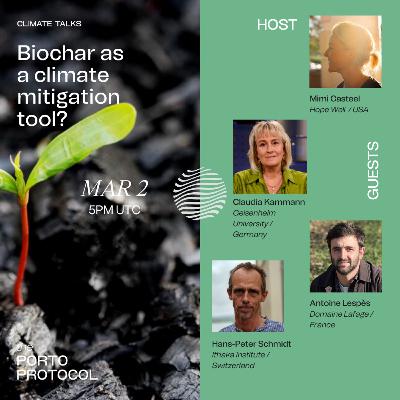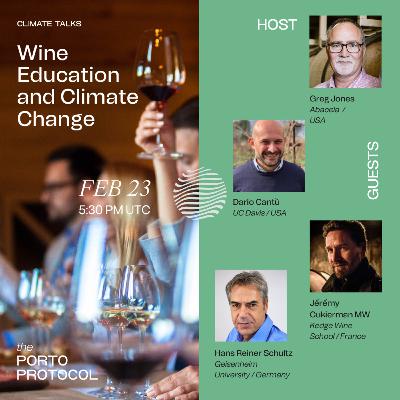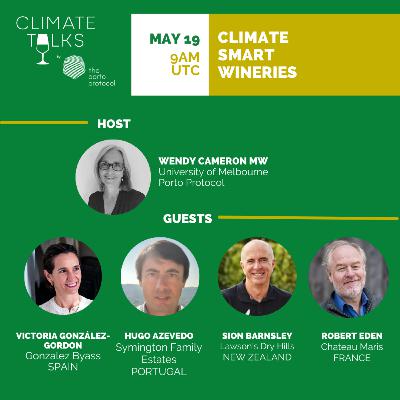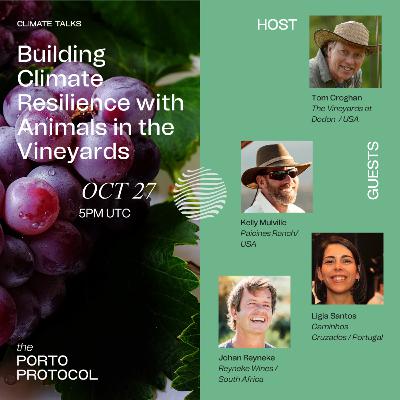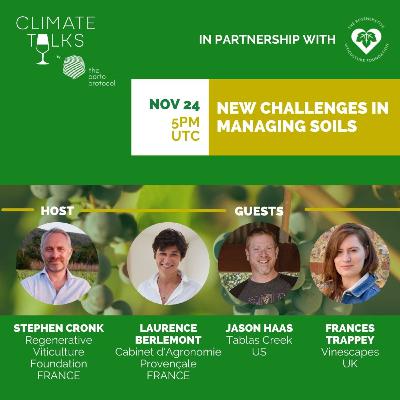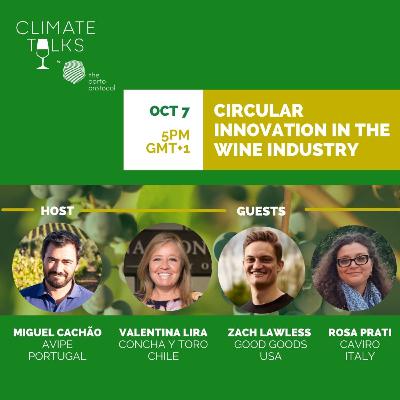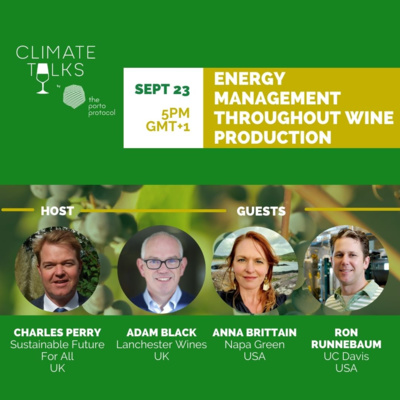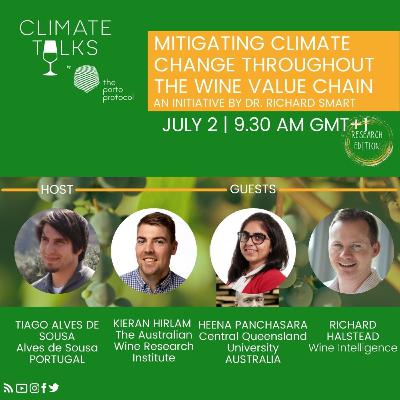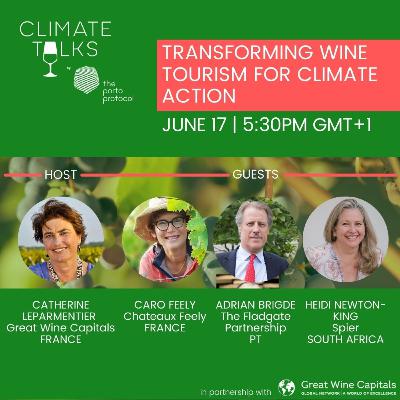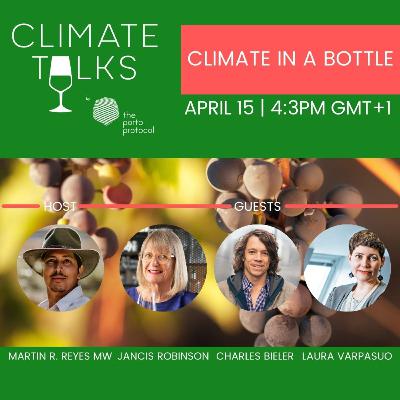Discover Climate Talks by Porto Protocol
Climate Talks by Porto Protocol

Climate Talks by Porto Protocol
Author: The Porto Protocol Foundation
Subscribed: 1Played: 0Subscribe
Share
© The Porto Protocol Foundation
Description
Climate Talks by Porto Protocol are a series of digital dialogues on matters relevant to the wine world in a changing climate.
From sustainable packaging to the role of nature and technology in building a climate response, different topics have been debated at our virtual roundtable with speakers from different corners of the world, that share their expertise, experience and challenges, thus inspiring those who listen to act further.
From sustainable packaging to the role of nature and technology in building a climate response, different topics have been debated at our virtual roundtable with speakers from different corners of the world, that share their expertise, experience and challenges, thus inspiring those who listen to act further.
51 Episodes
Reverse
Moderated by Jihany Brecci, founder of Stella Pietro Vineyards, this special research edition of the Climate Talks features Dr. Kees van Leeuwen, Professor and Researcher at Bordeaux University’s Institute of Sciences de la Vigne et du Vin (ISVV), Dr. Hervé Quénol, Geographer-Climatologist of France’s National Centre for Scientific Research (CNRS) and Helena Ferreira Manuel, Head of Agriculture Management and Sustainability at Herdade dos Lagos.
This was an extremely insightful talk, bridging research with wine producers.
For Additional resources from this talk and on the topic:
https://www.portoprotocol.com/solution/water-in-vineyards-research-edition/
As vineyards face climate challenges and biodiversity loss, agroforestry offers a promising way forward—blending trees, shrubs, and diverse flora to enhance soil health, biodiversity, and resilience. Yet, there are no one-size-fits-all solutions, and much remains uncertain.
This second edition, in partnership with the Regenerative Viticulture Foundation, deepens the conversation, sharing insights, case studies, and ongoing learning in the journey toward climate-conscious, sustainable wine growing.
January 16Th
🕔 5pm London | 🕕 6pm Paris | 🕘 9am California
Panelists:🍇 Anne Jones (Regenerative Viticulture Foundation)🌿 Emmanuel Bourguignon (LAMS-21/France)🌿 Katia Nussbaum (San polino/Italy)🌿Olga Barbosa (Universidad Austral de Chile)
This was the first of a series of talks in partnership with The Regenerative Viticulture Foundation!
It focused on the topic of Agroforestry in Vineyards. In a nutshell: how to combine trees and vineyards to benefit soil health, ecosystems, and wine quality.
As always, we’ve gathered a fantastic panel that bridges the Old World and New World of wine. Caro Feely will serve as our host and moderator, bringing her experience in fostering biodiversity at Chateau Feely, to guide the discussion and explore with our panelists how agroforestry can (or can’t) be applied in a vineyard context.
Panelists:
🍇 Caro Feely (CHATEAU FEELY/France) – Host
🌿 Ted Lemon (Littorai Wines/USA)
🌿 Juliette Combe (Château Cheval Blanc /France)
🌿Alain Canet (BHBZ Agroforestry Strategy/France)
The water footprint (WF) of a product is an indicator of the consumptive use of water resources along its life cycle. Water scarcity is recognized to be a major global challenge. As such, the evaluation of the WF of agro-industrial products is key, as they are widely known as having a significant footprint on water resources.
According to the Water Footprint Network The global average water footprint of grapes is 610 liter/kg. One kilogram of grapes results in 0.7 liter of wine, so the water footprint of wine is APPROXIMATELY 870 liters of water per liter of wine. This means that one glass of wine (125 ml) costs 110 liters (a). Even knowing that the vine has a capacity for survival and resilience to austere climates, as we speak, the increased production of grapes and wine, combined with droughts and climate change, sore than ever, water needs to be used efficiently. Therefore, there is a need to understand where and how we can improve water management in the wine life cycle, reduce it, or even eliminate it.
THE DISCUSSION
This Climate Talk addresses this issue and tries to identify the major challenges to the use of water throughout grape and wine production in this warming climate. In this conversation, we will analyze the importance of efficient use of water and explore the best technologies and practices available both in the field and on the wineries. To do so, we will count on different guests from around the world.
GUESTS
Michele Manelli (Salcheto, Italy)
Andrej Razumovsky (Alpamanta, Argentina)
Aaron Schreiber-Stainthorp (Jackson Family Wines, USA)
HOST
João Barroso (WASP - Wines of Alentejo Sustainability Programme, Portugal)
Our first one-to-one Climate Talk will be a discussion between Greg Jones (Climatologist and CEO at Abacela) and Etienne Neethling (Head of the international master program in vine, wine, and terroir management at the Ecole Supérieure de L’Agriculture and an OIV expert within the ENVIRO group).
They will be exploring what wine regions are similar in its various dimensions, from soil to grape varieties.
DISCUSSION TOPICS
What is a climate analogue?
Which bioclimatic indices are specific to grape and wine production and how do we calculate them?
Which wine regions have similar climates?
Is climate change a major environmental challenge for the wine sector?
Can European wine regions draw on viticultural lessons from warmer and drier wine regions in countries like South Africa or Australia?
What are the opportunities and challenges for emerging cool wine production regions or regions?
Click HERE for the presentation
https://youtu.be/FsgmBONlkEU
Our partners at The Regenerative Viticulture Foundation challenged us to open our climate talks space for their trustee, Caine Thompson (O'Neill Vintners & Distillers). Caine will share in detail O’Neill’s transition toward regenerative organic practices and the findings from their three-year comparison studies.
This is an unmissable presentation and discussion!
GUESTS:
Caine Thompson (Head of Sustainability, O’Neill Vintners & Distillers | Managing Director, Robert Hall Winery)
Emmanuel Bourgignon (Porto Protocol Living Vineyards’ Leading Teams)
Charlie Dubbe – Agrology
HOST
Anne Jones (Regenerative Viticulture Foundation)
This discussion will explore regenerative viticulture’s impact on water conservation in this engaging webinar. Learn from experts as they share strategies for saving water in vineyards. Discover innovative approaches that promote sustainable water management while maintaining wine quality. This webinar inspires vineyard owners, winemakers, and enthusiasts to embrace regenerative viticulture for a sustainable future, preserving water resources and ensuring the wine industry’s longevity.
Jessica Villat will host the talk with Elizabeth Whitlow (Regenerative Organic Alliance), Mimi Casteel (Regenerative Viticulture Foundation) and Francisco Font (Associación de Viticultura Regenerativa).
Dans le contexte du changement climatique, les cépages jouent un rôle important dans les solutions adaptation. Sachant que selon l’OIV, il existe 6000 cépages et que 13 d’entre eux couvrent le tiers des vignobles, est-il nécessaire de considérer les hybrides? Alors que certains ont la certitude que les hybrides vont jouer un rôle positif dans le futur, d’autres prônent l’exploration des cépages existants et de leurs clones ainsi que des recherches plus avancées sur les porte-greffe.
INVITÉE
Michelle Boufard - Tasting Climate Change - Canada
Lilian Bérillon - Pepiniere Berillon - France
Yiannis Paraskevopoulos - Gaia Wines - Greece
Michael Marler - Vignobles Pervenches - Canada
This Climate Talk was hosted by Mimi Casteel from Hope Well Wine with Claudia Kammann from Hochschule Geisenheim University, Hans-Peter Schmidt from Ithaka Institute and Antoine Lespès from Domaine LAFAGE as guest speakers.
INTRODUCTION
In the ever-expanding ocean of sustainability technologies, you have undoubtedly heard the term biochar. Once relegated to fringe-conversations, biochar has now gained a strong foothold in mainstream academic and applied research, and its use is being studied for everything from climate change mitigation to restoration of soil carbon stores, recovery of soil structure, nutrient cycles and function, soil remediation and detoxification applications, bioenergy production, and more.
Biochar is a specific form of charcoal produced through pyrolysis, which is the conversion of organic materials (biomass) under very high temperatures (greater than 500*C) to black carbon in the absence of oxygen. This form of Carbon is incredibly durable and resistant to decomposition that it can be a long-term storage form of Carbon in soils. The production techniques used in making biochar are commensurate with its potential benefits, and anyone considering biochar should become fluent in the best practices for its production. However, given the almost unfathomable sources of feedstocks, from animal manures to thinning of forest biomes for fire mitigation, to crop residues, biochar is a very exciting topic and its potential benefits in the climate crisis are myriad.
For farmers and land managers, biochar is exciting for a number of reasons, which we will get into deeply today. Its alkalinity can naturally lower acidic soil pH, can help hold soluble positively charged cations like Calcium and Potassium, it can decrease soil bulk density in compacted soils, increase aggregation, aeration, reduce leaching, bind and sequester toxins, and perhaps most importantly (at least to me), biochar has an unparalleled potential in the campaign to rehydrate soils most at risk for desertification. I’ve seen this benefit myself, and I am really looking forward to exploring all of these topics with our panel of experts.
WATCH
Wine is first and foremost an agricultural product, extremely vulnerable to climate change. Its impact is being experienced by vintners in a variety of ways, as extreme weather events, from droughts to heat waves, from out of season hail to floods, are impacting yields, phenology, wine quality and taste and vines health. Harvests have been lost and new regions have arisen because of it.
But just as wine production is affected by a changing climate it also contributes to enhance it in a variety of ways, may it be through the choice of packaging, viticulture practices or transportation.
In this Climate Talk we’ll seek to understand how key education institutions around the world are changing their curriculums to prepare a new breath of future vintners, viticulturists, and wine business managers to acquire the necessary skills and knowledge to address the new reality they will encounter and ultimately protect the wine industry.
GUESTS:
Hans Reiner Schultz, President at the Geisenheim University / Germany
Jeremy Cukierman, MW and Director at Kedge Wine School / France
Dario Cantù, Professor and Chair at the Department of Viticulture and Enology at UCDAVIS; Executive director of the UC Davis Chile Life Sciences Innovation Center/ USA and Chile
HOST:
Greg Jones / Abacela winery / USA (Climatologist and former-Professor at Lindfield College)
This Climate Talk is dedicated to sharing different practices that make a winery more efficient and less impactful from an environmental standpoint, exploring topics such as the choice of building materials, solar exposure, energy and water management of and waste minimization. As usual, we will have excellent guests, who will share several of their experiences, from the construction of a LEED building and the challenges behind its certification, to the use of alternative building materials (hemp) as a smart solution for a winery, to the balance as a whole between efficiency, environment and quality in wine production. HOST - Wendy Cameron (University of Melbourne and a member of our Expert Panel) GUESTS - Hugo Azevedo – Symington family Estates - Portugal https://pt.symington.com/- Robert Eden Chateau Maris - France - https://chateaumaris.com/- Victoria Gonzalez- Gordon (Gonzalez Byass) - Spain - https://gonzalezbyass.com/en-gb- Sion Bra- Gordon - Lawsons Dry Hills - New Zealand - https://lawsonsdryhills.co.nz/
This Climate Talk is moving past the “low-hanging fruit” and reaching for the stars – showcasing wine bottle reuse. The bottle accounts for 50% of a wineries’ CO2 emissions, due to the amount of heat required to melt glass along with transportation. Recycling decreases total emissions however, the CO2 budget of a bottle made from recycled glass is still very high, and much of the world’s recycling infrastructure is dysfunctional, leaving a huge proportion of wine bottles buried in landfills. For the wine industry to reach zero emissions and continue to use the very best, inert recipient for bottle aging, the only solution is bottle reuse. Four companies, from different countries, join us to share their experience with bottle reuse so that we can revive this once widely practiced tradition. HOST - Diana Snowden Seysses – Winemaker at Domaine Dujac, Winemaker and Proprietor at Snowden Vineyards and member of The Porto Protocol’s Global Steering Committee
GUESTS
- Melissa Saunders MW - Wine Director at The Goods Good - USA
- Muriel Chatel - Managing Director of Borough Wines & Sustainable Wine Solution – UK
- Bertrand Grafé - Owner of Grafé Lecocq - Belgium
- Lise Rolland - Marketing and communications director for Oé - France
In this Climate Talk we explored what an Operations Executive needs to consider to implement strategic changes across the whole value chain: From logistics, packing to warehousing and offices; From waste, water and energy management, to tracing hidden wastes and looking at the whole product’s life cycle. From reevaluating transportation to organizational culture, customer and workforce motivations as well geographical differences.
GUESTS
Richard Lloyd (Accolade Wines) - https://www.accoladefinewines.com/-
Nicolas Quillé (Crimson Wine Group) - https://www.crimsonwinegroup.com/-
Mafalda Vasques (Herdade dos grous) - http://www.herdadedosgrous.pt/
HOST - Marta Mendonça – The Porto Protocol
The use of grazing animals in vineyards seems to be of increasing interest and use around the globe. The information available indicates that it is a vineyard management tool that finds compatibility with regenerative, organic, and biodynamic farming practices. This discussion will focus on the many benefits to this technique of vineyard management. You will gain information from vineyard managers about their experiences and the reasons for their choice of animals and the how and why they integrated this tool into their vineyards along with results of their decisions. Finally, we’ll discuss how animals enhance carbon sequestration, soil health and biodiversity and offer reduction in the use of herbicides and chemicals. This is a unique opportunity to learn about and understand this growing trend that has been around for centuries and pose questions to our guests from around the world.
GUESTS:
- Kelly Mulville. USA - Paicines Ranch (California) - https://paicinesranch.com/
- Lígia Santos. Portugal - Caminhos Cruzados (Dão) - https://caminhoscruzados.net/
- Johan Reyneke. ZA – Reyneke wines (Stellenbosch)- reynekewines.co.za
HOST:
- Tom Croghan. USA – The Vineyard at Dodon (Maryland) - https://www.dodonvineyards.com/
In this Climate Talk, organized in cooperation with The Regenerative Viticulture Foundation, we will explore the importance of soil health in vineyards, and the new challenges which arise when managing that soil health using regenerative practices.
What is the importance of soil health in a vineyard? What are the essentials of soil management? What changes are observed with a more regenerative approach?
As usual, we are joined by producers and consultants from different parts of the world that are already leading the way in regenerative viticulture to share what they are doing and what outcomes they have witnessed.
HOST
STEPHEN CRONK - CO-FOUNDER OF MAISON MIRABEAU AND FOUNDER TRUSTEE AT REGENERATIVE VITICULTURE FOUNDATION - FRANCE
GUESTS
FRANCES TRAPPEY - CONSULTANT VITICULTURIST AT VINESCAPES - UK
LAURENCE BERLEMONT - FOUNDER OF CABINET D’AGRONOMIE PROVENÇALE - FRANCE
JASON HAAS - PARTNER AND GENERAL MANAGER AT TABLAS CREEK . USA
This Climate Talk addresses the state of art of circular innovation in wine, by bringing together different players from the wine value chain, but also from other industries with in-depth knowledge and approaches to circular practices. They explore how the wine industry can connect the dots of its value chain in a circular way, bringing examples tested with by-products of the wine production, as well as the applicability and suitability, from big to small practices, across different regions and realities.
GUESTS Rosa Prati (Caviro Winery) - ITALY
Valentina Lira (Concha Y Toro) - CHILE
Zach Lawless (Good Goods) - USA
HOST Miguel Cachão (AVIPE) - PORTUGAL
For this Climate Talk on energy management throughout wine production, we have invited Charles Perry (Sustainable Future for All) to host a conversation between Adam Black, (Head of Energy at Lanchester Wines) Anna Brittain (Executive Director at Napa Green) and Ron Runnebaum (Assistant Professor In Viticulture & Enology And In Chemical Engineering & Materials Science at University of California, Davis).
From irrigation pumps to winery lighting, a company’s car fleet, mechanization in the vineyard, to energy used for packaging production and transportation, no matter what stage of wine production you may look at, energy consumption and management is at the core of the problem as well as the solution to #climatechange in general and the impact of wine production on the environment.
These three stakeholders will cover a variety of #energymanagement approaches, strategies, from simple to complex solutions (such as UC Davis' Platinum certified #LEED winery), to different sources of #renewableenergies (solar, wind and geothermal).
This approach with players from different stages of #wineproduction will enable us to dig deeper as we bridge the knowledge and challenges generated by academia and producers.
Learn more about the talk and our guests here: https://lnkd.in/dnTQgBfY
This Climate Talk is an initiative of Dr. Richard Smart, renowned International Wine Grower and Consultant.
Dr. Smart challenged Porto Protocol to organize a webinar about mitigation (vs adaptation), on reducing the carbon footprint of the grape and wine sector. In his own words, mitigation is more of an ethical decision than an economic one, and the focus is on avoiding the causes of the climate crisis so that it does not happen. According to him “it is a decision that an industry can take to help ensure its future, in the same spirit in which this decision is being taken by countries and states, communities and families”.
This session was the first “Research Edition” of our Climate Talks by Porto Protocol, a slightly different format from what our community is used to: we will have a series of presentations, each focused on different research themes, either from a scientific or market approach, on different components underlying the decision to mitigate:
- Kieran Hirlam (AWRI) will present Life Cycle Analysis (LCA) and carbon footprint to demonstrate that the 750ml glass bottle is an important component of the industry's carbon footprint.
- Heena Panchasara (Central Queensland University) will describe how pyrolysis enables the industry to convert waste streams from vineyards and wineries into energy.
- Richard Halstead (Wine Intelligence) will discuss how the glass bottle can be replaced by alternative packaging and how wine consumers can react.
These presentations were followed by a debate moderated by Tiago Alves de Sousa (Alves de Sousa), Producer and Professor (UTAD), who will bridge the gap between the conclusions resulting from the investigation of each guest and their adaptation to the day-to-day life of the vineyard and wine sector. For those in the grape and wine industry who see a response to the climate crisis beyond adaptation, we hope this digital conversation will serve as an incentive to contemplate mitigation.
In this Climate Talk we will debate how wine tourism businesses are dealing with the climate challenges and what is the role it can play on adapting and mitigating it. We will gather different players from the wine tourism sector to discuss the major changes wine tourism needs to address a green transition. We’ll explore what have been the consumers' demands and expectations regarding this topic, and, in a very practical way, what are the measures they have been implementing to turn their wine tourism operation into a more efficient and environmentally friendly one. We will also approach what are the fundamental changes this path will bring into the modus operandi of the business? What are the barriers and the opportunities that can arise from it and risks involved? How can wine production values be aligned with the wine tourism operation?
GUESTS
Adrian Bridge, CEO of The Fladgate Partnership & The Porto Protocol Foundation (Portugal) - https://www.taylor.pt/pt;
Caroline Feely, Co-owner and Director at Chateaux Feely, (France) - https://chateaufeely.com/
Heidi-Newton-King, Sustainability Director at Spier (South Africa) - https://www.spier.co.za/
HOST:
Catherine Leparmentier, Managing Director at Great Wine Capitals - https://www.greatwinecapitals.com/
In this Climate Talk we will discuss the various issues around the glass bottle, the element that contributes the most to the carbon footprint of wine. As we bring to the table various stakeholders from the wine value chain, we will try to understand how producers, trade and consumers are perceiving and addressing this elephant in the room.
HOST
• Martin R. Reyes MW, Owner of Reyes Wine Group
GUESTS
• Jancis Robinson MW - Wine Critic, Journalist, Writer and Founder of Jancisrobinson.com
• Charles Bieler - Owner at Bieler Wines and Co-Founder of the Gotham Project
• Laura Varpasuo - Sustainability Manager at Alko (Finland’s Alcohol Monopoly)


